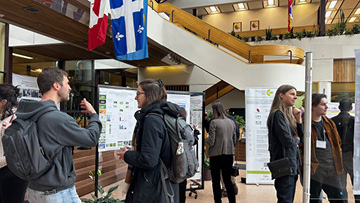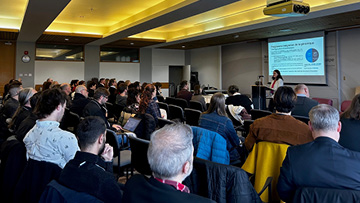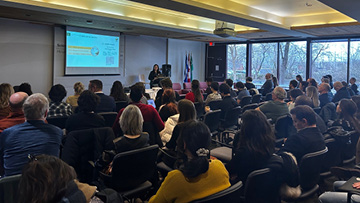In Quebec, research into greenhouse production continues to be very active and innovative in support of growers. Collaborations and research projects within the scientific community are multiplying to meet the needs of the greenhouse sector.
On March 19, researchers, farmers and other stakeholders gathered at our Saint-Hyacinthe Research and Development Centre for a networking event.
More than 90 participants attended the second edition of this event organized by Agriculture and Agri-Food Canada (AAFC) in conjunction with the Ministère de l'Agriculture, des Pêcheries et de l'Alimentation du Québec (MAPAQ) and Producteurs en serre du Québec (PSQ). Agriculture consultants and other stakeholders also took part in the event.
This was an opportunity for participants to learn more about research projects related to greenhouse production. The purpose of the activity was to encourage exchanges between participants so they could better understand each other's needs and challenges, and to ensure the transfer of new knowledge.
Research to support the development of the greenhouse sector
Speakers from Hydro-Québec, Université Laval, McGill University, Bishop's University, Génome Québec, Polytechnique Montréal, PSQ and AAFC highlighted research projects on:
- the development of innovative greenhouses;
- renewable energies;
- waste recovery technologies;
- phytotechnology;
- the application of genomics;
- the use of cold plasma.
"This networking event attracted a great deal of interest from experts and stakeholders in Quebec's greenhouse vegetable sector. We can confirm that the high level of research expertise in Quebec and its great diversity enable us to support the sector well. The participation of farmers is crucial in allowing them to make their challenges and needs known directly to researchers and other stakeholders in the sector." Samuel Dagenais, agr., Senior Industry Development Officer, Quebec and Nunavut Regional Office, AAFC
The commitment of AAFC researchers
The attendance of AAFC researchers enabled participants to learn more about the research conducted at the Department. The expertise of AAFC's Research and Development Centres (RDCs) involved in greenhouse research was introduced, including the work of scientists from the Agassiz RDC in British Columbia, the Harrow RDC in Ontario, the Saint-Jean-sur-Richelieu RDC in Quebec and the Kentville RDC in Nova Scotia.
Jean-Philippe Parent, a researcher at the Saint-Jean-sur-Richelieu RDC, talked about his research into vibratory control in the fight against aphids. The idea is to harness the potential of plant vibration to counter pests without resorting to chemical pesticides.
Vicky Lévesque, a researcher at Kentville RDC, presented her research into the use of biochar, a stable, carbon-rich material composed of organic residues such as plants and wood waste, to improve the growth of horticultural plants and the quality and health of soils. Biochar enables soils to reduce emissions of nitrous oxide, a major greenhouse gas that contributes to global warming and ozone depletion.
Sébastien Villeneuve, a researcher at Saint-Hyacinthe RDC, shared his research on a platform that would enable the food chain industry to better understand the impact of road transport, including vibrations and temperature changes, on food safety and shelf life.
Productive discussions
To wind up the day, MAPAQ horticultural advisors led panels bringing together greenhouse growers from different regions of Quebec and researchers from various universities and organizations.
Some highlights
- It is essential that projects are well adapted to producers' realities, and that they are economically profitable.
- Validation of new technologies remains a priority for farmers. They would like to see more demonstration showcases to increase the adoption of research results.
- One of the biggest challenges raised by farmers is the integration and effective adoption of research results within farm businesses.
- Research into the production of vegetable transplants in greenhouses is also important, as it ensures the supply for market garden production in the field.
- The role of advisors and agronomists in knowledge transfer and the adoption of research results is vital to the development of greenhouse businesses.
- Fundamental research remains crucial to identifying new avenues for innovative solutions to meet needs.
"The panels put the spotlight on the challenges faced by producers and researchers, all of them unique. They included the challenges of balancing the constraints imposed by research with the immediate needs of participating companies, company recruitment, orphan themes, strategies for disseminating results and developing collaborations, sources of motivation and then commercial scale-up. The dynamism of the discussions made it clear that they all had one thing in common: passion!" - Marie-Michelle Gamache, agr., Development Advisor, Agrifood Sector Development Branch, MAPAQ
The need for networking activities
Networking is essential for identifying opportunities for collaboration, implementing knowledge transfer initiatives and adapting research projects to the needs of the sector and businesses. These activities help to create synergy between all players in the industry, with the purpose of improving the sector's resilience in the face of challenges, and fostering a prosperous, resilient and sustainable sector.
To find out more about the research projects carried out by Agriculture and Agri-Food Canada: Scientific achievements in agriculture




Get more Agri-info
- Want more stories like this? Explore what else Agri-info has to offer.
- Interested in reporting on this story? Contact AAFC Media Relations at aafc.mediarelations-relationsmedias.aac@agr.gc.ca to arrange an interview with one of our experts.